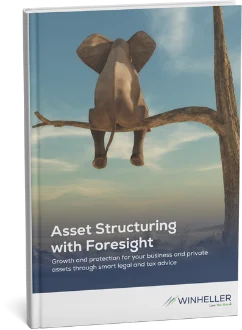Tax Exemption for Business Assets in Germany
The transfer of assets by inheritance or gift is subject to special tax regulations in Germany. The legislator has created a separate set of rules for this purpose, which sets out the corresponding tax obligations - the Inheritance Tax and Gift Tax Act (Erbschaftsteuergesetz, ErbStG).
For business assets, there are special reliefs that lead to complete tax exemption under certain conditions. These concessions are not limited to certain types of companies, but apply equally to different types of companies - from sole proprietorships to corporations.

Which business assets can be transferred tax-free?
The primary aim of the inheritance and gift tax regulations for business assets is to facilitate business succession for tax purposes. The German legislator wants to ensure that business takeovers are not jeopardized by additional tax burdens.
The statutory provisions specifically differentiate between assets that are essential to the business and assets that are less relevant to the actual business activity. This differentiation is made through a multi-level regulatory system:
- The basic definition of which types of assets are eligible for preferential treatment at all (section 13b para. 1 ErbStG),
- The determination of the required composition of business assets (section 13b para. 2 ErbStG),
- The definition of non-preferential “administrative assets” (section 13b para. 4 ErbStG),
- The calculation method for determining the actual tax relief (section 13b para. 6 and 7 ErbStG).
These regulations are particularly characterized by their complex structure with numerous cross-references between the individual provisions. For practical application, it is therefore advisable to refer to the official guidelines, which provide a complete calculation scheme.
What are administrative assets?
Administrative assets include those assets of a company that formally form part of the business assets for tax purposes, but are only of secondary importance or of no importance at all for the actual business activity. In Section 13b para. 4 ErbStG, the legislator specifically defines which assets are to be classified as administrative assets:
- Land rented or leased to third parties (with the exception of the leasing of an entire business),
- Minority interests in corporations of less than 25 percent of the share capital, provided that trading in such shares is not the main purpose of the company,
- luxury goods such as art collections, vintage cars and yachts,
- securities and comparable monetary claims (exception: financial services companies); this also includes, for example, receivables from customers.
The legislator takes a particularly critical view of so-called young financial assets - i.e. deposits and withdrawals made within two years prior to the transfer of the company. These are generally classified as administrative assets. In practice, these include, in particular, cash deposits recently made by the shareholders.
Can administrative assets be transferred tax-free?
Administrative assets can actually be transferred tax-free under certain conditions. The decisive factor here is the share of administrative assets in the company's total assets:
- If the net value of the administrative assets is less than 10 percent of the total business assets, a full tax exemption for the entire transferred business assets can be considered (option exemption).
- If the proportion of administrative assets is above this threshold but less than 90 percent of the total assets, a partial tax exemption is possible (standard exemption). In this case, the net value of the administrative assets is deducted from the business assets eligible for tax relief, whereby a harmless portion of the administrative assets is taken into account.
- If the administrative assets exceed the 90 percent threshold, the tax relief does not apply in full.
To calculate the net value of the administrative assets, the corresponding debts are deducted from the fair market value of the total administrative assets. When examining the 10 percent limit, “young financial resources” and “young administrative assets” (assets that have belonged to the business for less than two years) are not taken into account. The tax treatment of administrative assets clearly shows the legislative intention: only assets that are actually necessary for the business should benefit in full from the tax concessions.
The preferential treatment only applies if certain types of assets are present (such as agricultural and forestry assets, business assets or qualifying shares in corporations) and the proportion of non-operating administrative assets does not exceed certain limits. A commercial enterprise (e.g. sole proprietorship) is also eligible if a permanent establishment is maintained outside Germany but within the EU. In the case of corporations, the shareholder must hold a stake of at least 25 percent and the registered office or management must be located in Germany or the EU.
Standard exemption vs. option exemption
After determining the preferential business assets in accordance with Section 13b ErbStG, inheritance tax law offers two options for tax exemption:
1. Standard exemption (85 percent tax-free):
- This applies automatically to favored assets under EUR 26 million.
- The remaining 15 percent is generally subject to taxation.
- Depending on the individual asset composition, a tax-free transfer may be possible despite the existence of harmful administrative assets, e.g. due to applicable allowances. However, this must be examined on a case-by-case basis.
2. Option exemption (100 percent tax-free):
- This can be chosen if the administrative assets account for less than 20 percent of the total assets eligible for preferential treatment.
- It enables complete tax exemption.
There are other points that must also be fulfilled after the transfer (e.g. retention periods, payroll regulations) in order to enable a tax-privileged transfer. In practice, this can primarily affect entrepreneurs who are aiming for a prompt sale after the transfer or are planning redundancies.
There are two alternative options for larger asset transfers over EUR 26 million:
- Gradual tax relief: The tax relief is gradually reduced by 1 percent for every EUR 750,000 above the limit.
- Testing the need for tax relief: Possibility of tax remission if the acquirer is demonstrably unable to pay the tax.
The acquirer must choose between the diminishing relief discount and the needs test - a combination of both concessions is not possible.
WINHELLER advises on preferential business assets
Our experienced tax advisors and specialist tax attorneys will be happy to assist you with the transfer of assets. We support you in
- Determining the amount of preferential assets and the amount of possible gift/inheritance tax
- Examining the feasibility of a tax-free or tax-privileged transfer of your company, taking into account the financial figures and your individual future plans
- Designing and implementing the necessary steps to enable a preferential transfer of your company or to prepare it for the future
Your tax advisors for the transfer of tax-free business assets in Germany
Would you like to transfer your business to the next generation? Would you like to know whether your business assets can be transferred tax-free or what measures need to be taken to enable a tax-free transfer in the future? Our specialist advisors will be happy to answer any questions you may have about inheritance and gift tax. Feel free to contact us with your questions!
The easiest way to contact us is by e-mail (info@winheller.com) or by telephone (+49 69 76 75 77 85 22).
Do you need support?
Do you have questions about our services or would you like to arrange a personal consultation? We look forward to hearing from you! Please fill in the following information.
Or give us a call: +49 69 76 75 77 85 22






